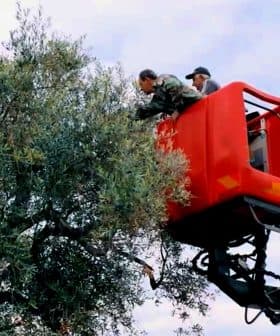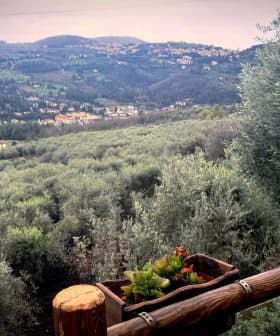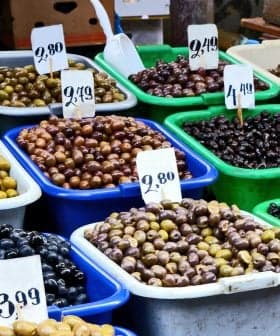Greek Producers Report Poor Harvest for Quantity, Quality
After a bad harvest, olive farmers and oil producers may not be able to receive compensation. However, small producers have a chance to shine in a depleted field of competitors.
The olive oil production in Greece is expected to be significantly lower this year due to adverse weather and fruit fly infestations, with estimates ranging from 200,000 to 240,000 tons compared to 350,000 tons in the previous season. Producers in various regions, such as Lesvos, Halkidiki, Messinia, Lakonia, and Crete, are reporting reduced yields, with some facing quality issues that have led to downgrades in classification. Despite the challenges, small producers who have focused on quality over quantity may have an opportunity to shine in this difficult season.
With the harvesting season almost at its end in Greece, the uncertainty remains about the volume of olive oil produced.
Some industry experts expect that the initial predictions will be verified and the crop will reach 240,000 tons, while others estimate it to be even less and come in at around 200,000 tons.
The adverse weather and the fruit fly affected the olive oil crop in the whole country. Our olive groves show a reduction in their output by 35 to 45 percent compared to last season.
In any case, the total quantity of olive oil will be significantly smaller than the 350,000 tons of the previous season.
The majority of the olive oil making territories of the country faced significant problems with the fruit fly and fluctuations in the weather, which inevitably led to lower production, both in terms of quantity and quality.
See Also:Greek Olive Oil NewsThe island of Lesvos suffered a severe decrease in its olive oil production, as the members of the Agricultural Association of Stypsi, in the north of the island, told Olive Oil Times.
“We cultivate only the Adramytini variety here and due to the many rainy days we had, harvesting is still ongoing,” producers said.
“But the fruit fly and even more the change of our microclimate that brought periods of warm weather when we should have cold weather, seriously affected our olive trees and the produced olive oil,” they added.
Their estimation of the total production was disappointing, as it is likely to be only half of last year’s yield.
“We expect to get around 50 percent of the previous season’s olive oil in our area with most of it being virgin and not extra virgin, while the whole island will likely make 4,000 to 5,000 tons compared to 12,000 tons delivered the last season,” producers said. “So, we will have significantly less extra virgin to sell as standardized extra virgin olive oil of Lesvos.”
In Halkidiki, an area well-known for its table olives and also for its early harvested extra virgin olive oil, Ioannis Schinas is the owner of a mill located on the Kassandra peninsula.
He told Olive Oil Times that the current harvesting season is far from prosperous, with the quantity having plummeted as never before.
“Out of four mills located on the Kassandra peninsula ours was the only one that operated this season,” he said. “We managed to get only 20 tons of olive oil, while the previous season the overall production was 2,000 tons from all the four mills.”
He also stumbled upon a situation he had never faced before, with some of his extra virgin olive oil being degraded to lampante oil when exported to Italy.
“Our tests here classified it as extra virgin, but the analytical tests in Italy classified it as lampante, not even virgin,” Schinas said. “This was because of the magnitude of the damage the fruit fly had caused that rendered some of our extra virgin to be of lower quality, something that the initial tests had failed to pinpoint. I know that this has happened to many other producers and mill owners in the country.”
Iohannis Kampouris, a producer and exporter of olive oil based near ancient Mycenae, pointed out the usual suspects for the reduced crop this season.
“The adverse weather and the fruit fly affected the olive oil crop in the whole country. Our olive groves in Korinthia, Lakonia, and Lamia show a reduction in their output by 35 to 45 percent compared to last season,” he said.
But despite the grim situation, he identified an opportunity that might exist for small producers to stand out.
“The producers who devoted time to cater to their groves and executed precise crop-dusting operations received olive oils of high quality, provided that harvest and processing of the olives occurred on time,” he said. “So, instead of the usual mass production, small producers will be able to demonstrate their quality products.”
Several other territories of Greece are expected to have lower olive oil yields this year as well.
In Messinia, one of the most bountiful areas of the country, the production is calculated at only 38,000 tons with 75 percent of it being extra virgin olive oil. The harvest of the whole region usually exceeds 50,000 tons of top-quality olive oil.
In the neighboring region of Lakonia, the overall yield is expected to be less than half of the usual 25,000 tons of olive oil.
In Crete, which normally makes up one-third of the country’s total olive oil production, the yield is estimated at roughly 60,000 tons compared to 85,000 tons in the previous season.
In the meantime, some members of parliament urged the Ministry of Agriculture to provide compensation for affected olive oil producers by employing the so-called ‘de minimis’ aid funds of the European Commission.
The ministry replied that most of the available de minimis funds have already been allocated to other sectors, and there was no commitment for handouts any time soon.









